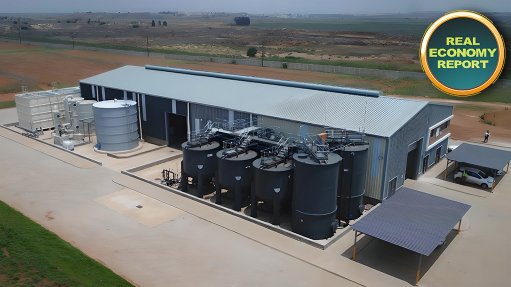Naamsa confirms it will publish inaugural Sustainability Report soon
In opening the inaugural South African Auto Week event, in Midrand, on October 25, Naamsa│Automotive Business Council CEO Mikel Mabasa said manufacturers need to invest in new energy vehicles (NEVs), but also in infrastructure and people, if the industry is to transition to carbon neutrality.
He confirmed that Naamsa would publish an inaugural Sustainability Report before the end of the year, to share how the automotive industry was performing on key metrics such as transformation, safety and energy and water use in production.
Currently, about 1.27 MWh of energy is used to produce one vehicle, while 3.64 m3 of water is used in the production of one vehicle. The average carbon dioxide emissions per vehicle produced stands at 1.07 kg, while each vehicle produced also produces 11.05 kg of waste to landfill.
Toyota South Africa Motors CEO Andrew Kirby shared a few insights on the report ahead of its publication, including that the automotive industry spends about 2.49 days a year training every employee, with the industry having a combined 121 skills development initiatives.
In terms of safety, the vehicle manufacturing sector recorded 363 accidents in 2021.
The sector also spent R361-million on corporate social initiatives last year.
Kirby said the sector remained hard at work in support for sustainability objectives, especially as the urgency for “new energy” continues.
In the nine months ended September 30, total NEV sales jumped by 796% to 3 092, compared with 345 NEVs sold in the nine months to September 30, 2021. Total NEV sales in 2021 were 896.
NEVs now comprise about 0.79% of vehicles sold in the market, compared with a market share of 0.10% in 2021.
Traditional hybrid, plug-in hybrid and electric vehicles sales grew by 1 239%, 153% and 796%, respectively, in the nine months ended September 30, compared with the same period last year.
To advance the electric vehicle (EV) industry, in particular, Naamsa has proposed government take a few pragmatic steps, such as lowering the duty on EV components, adjusting the volume assembly localisation allowance in respect of EV components, strengthening EV value chain-related investment and stimulating an ecosystem for surplus credit trade for cheaper EV imports.
The automotive industry is also advocating for a critical minerals strategy to be created, to not only plan around mining but also beneficiation. The industry hopes to see a battery assembler and power train assembler entering the market, to further broaden localisation.
The value of local content from vehicle production in 2021 increased to R75-billion from R57-billion in 2020, however, this was a decrease from R86-billion in 2019.
Kirby said local content had been central in government policy concerns, while it had also been a focal point for the industry. He added that the shift to NEVs represented more collaboration opportunities to increase local content and value.
GREY IMPORTS
Meanwhile, Naamsa retailing original-equipment manufacturers VP and Kia South Africa CEO Gary Scott estimated that there were more than 500 000 problem vehicles in South Africa, with almost half of them set to travel through South Africa to neighbouring countries, but never make it there.
Scott explained that even if it is assumed that all of the foreign number plates on these vehicles are legitimate and registered on the database of a neighbouring country, 440 000 vehicles have been in South Africa for longer than 12 months, which is not permitted, while 220 000 of these cars have never crossed the border.
Grey import vehicles refer to new or used motor vehicles that are imported from another country through channels other than the manufacturer’s official distribution system.
Scott said the number of grey imports was growing at 30 000 vehicles a year, and represented 7.5% of the local market. This had the impact of displacing new and local vehicle sales in the country, costing the country about R5-billion to R8-billion a year in uncollected taxes.
He pointed out that grey imports not only robbed the fiscus of much-needed revenue, but also hurt job creation prospects for many young people, not to mention that grey imports also undermined road safety initiatives.
Scott called grey imports the “thirteenth cheque” for the automotive industry, because it represented at least one extra month’s worth of sales of new vehicles being displaced in the country.
Although there is a control mechanism in place at some ports, many of these measures have fallen away, owing to management issues, for example.
Scott noted that Naamsa and other stakeholders, such as the South African Revenue Service and the International Trade Administration Commission, were trying to develop a coordinated plan to curb grey imports and impound these vehicles.
Naamsa has also urged the relevant Ministers to close the Roll on, Roll off used car terminal in Durban, which will force cars to come into the country in containers – which are much more traceable – instead of cars entering the country under their own steam.
Comments
Press Office
Announcements
What's On
Subscribe to improve your user experience...
Option 1 (equivalent of R125 a month):
Receive a weekly copy of Creamer Media's Engineering News & Mining Weekly magazine
(print copy for those in South Africa and e-magazine for those outside of South Africa)
Receive daily email newsletters
Access to full search results
Access archive of magazine back copies
Access to Projects in Progress
Access to ONE Research Report of your choice in PDF format
Option 2 (equivalent of R375 a month):
All benefits from Option 1
PLUS
Access to Creamer Media's Research Channel Africa for ALL Research Reports, in PDF format, on various industrial and mining sectors
including Electricity; Water; Energy Transition; Hydrogen; Roads, Rail and Ports; Coal; Gold; Platinum; Battery Metals; etc.
Already a subscriber?
Forgotten your password?
Receive weekly copy of Creamer Media's Engineering News & Mining Weekly magazine (print copy for those in South Africa and e-magazine for those outside of South Africa)
➕
Recieve daily email newsletters
➕
Access to full search results
➕
Access archive of magazine back copies
➕
Access to Projects in Progress
➕
Access to ONE Research Report of your choice in PDF format
RESEARCH CHANNEL AFRICA
R4500 (equivalent of R375 a month)
SUBSCRIBEAll benefits from Option 1
➕
Access to Creamer Media's Research Channel Africa for ALL Research Reports on various industrial and mining sectors, in PDF format, including on:
Electricity
➕
Water
➕
Energy Transition
➕
Hydrogen
➕
Roads, Rail and Ports
➕
Coal
➕
Gold
➕
Platinum
➕
Battery Metals
➕
etc.
Receive all benefits from Option 1 or Option 2 delivered to numerous people at your company
➕
Multiple User names and Passwords for simultaneous log-ins
➕
Intranet integration access to all in your organisation




















